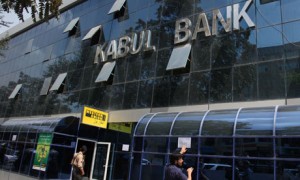Friday
Sep102010
US and Afghanistan: The Little Inconvenience of Corruption (Miller)
 Friday, September 10, 2010 at 12:38
Friday, September 10, 2010 at 12:38  Last month we featured articles which pointed not only to the problem of corruption within Afghanistan but to a political battle within the US Government over the issue, with some agencies accusing others of turning a blind eye to and even accepting the diversion of money. This week we noted the politics behind the near-collapse of the Kabul Bank.
Last month we featured articles which pointed not only to the problem of corruption within Afghanistan but to a political battle within the US Government over the issue, with some agencies accusing others of turning a blind eye to and even accepting the diversion of money. This week we noted the politics behind the near-collapse of the Kabul Bank.Greg Miller now writes in The Washington Post:
In the span of several months, U.S.-backed investigative teams have assembled alarming evidence of rampant corruption in Afghanistan and the extent to which it reaches the highest ranks of that nation's government.
Afghanistan: Petraeus “Success” Undone by Rising Casualties? (Porter)
But the American effort to increase Afghanistan's capacity to combat corruption has also had unintended consequences, aggravating the U.S. relationship with Afghan President Hamid Karzai and producing embarrassing revelations that have undermined attempts to build popular trust in the government in Kabul - a key component of the Obama administration's counterinsurgency campaign.
After pouring more resources into the anti-corruption effort over the past 18 months - including teams of advisers and sophisticated wiretapping technology - administration officials said there is growing concern that rooting out graft is paradoxically reinforcing perceptions that the problem is endemic.
"Our big push to help build Afghan institutions for transparency and anti-corruption has had the dismaying effect of bringing a lot of stuff to light that has sparked political crises," said a senior administration official. "Afghan institutions are growing more capable" of fighting corruption, the official said. But their work has the potential to "set us back."
The quandary in many ways reflects the extent to which the U.S. government has operated at cross-purposes in Afghanistan, doling out vast sums of money to win over warlords and buy security for military convoys, then cracking down on abuse in a system awash in American cash.
After nearly nine years of nation-building in Afghanistan, experts said, the U.S. government faces mounting evidence that it has helped to assemble one of the most corrupt governments in the world.
"I don't know how you can disaggregate the way in which [the U.S. government] has funneled money into Afghanistan from the crisis of corruption that presents itself today," said C. Christine Fair, an assistant professor at Georgetown University's School of Foreign Service who has monitored the U.S. role in Afghanistan. "We are a government at odds with ourselves."
Underscoring the Obama administration's sensitivity on the subject, officials persuaded Senate Foreign Relations Committee Chairman John F. Kerry (D-Mass.) to block the release of a report on corruption in Afghanistan that the panel's staff completed last month. Kerry had publicly mentioned that the report was coming. An administration official said the concern was about sensitive information contained in the document, but others blamed fears that its release would lead to further embarrassment for the U.S. government and Karzai.
There is no authoritative estimate of the toll that corruption has taken on the Afghan economy, which is sustained to a large extent by billions of dollars in American aid, as well as profits from drug trafficking.
U.S. officials acknowledge that they are still struggling to plug large leaks. An estimated $1 billion a year, for example, is leaving the country in bags of cash carried out of Kabul airport. Authorities suspect that much of the outflow is diverted foreign aid....
Read rest of article....
tagged  C Christine Fair,
C Christine Fair,  Greg Miller,
Greg Miller,  John Kerry,
John Kerry,  Kabul Bank,
Kabul Bank,  Washington Post in
Washington Post in  Afghanistan
Afghanistan
 C Christine Fair,
C Christine Fair,  Greg Miller,
Greg Miller,  John Kerry,
John Kerry,  Kabul Bank,
Kabul Bank,  Washington Post in
Washington Post in  Afghanistan
Afghanistan 
